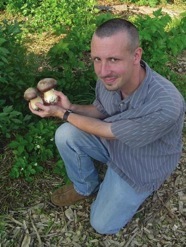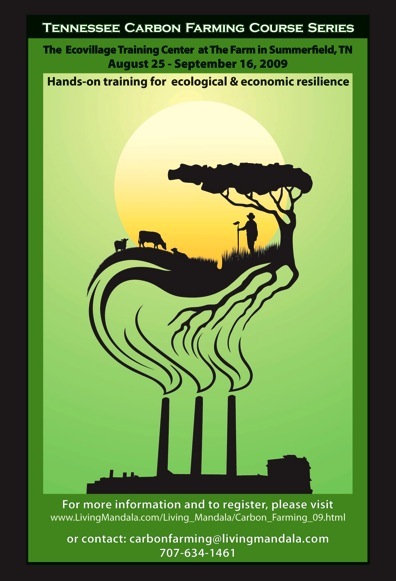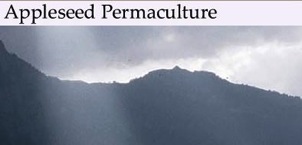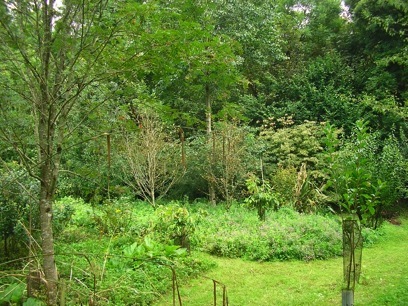Courses, Workshops & Events









Home | About Us | Contact Us | Store

2008, Living Mandala
creative services by: 360 Degrees
Including
FOOD FOREST GARDENING
RAIN WATER HARVESTING
In Association With
Carbon Farming Series
Rain Water Harvesting for Drylands & Beyond
Edible Forest Gardens
Eco-Village Training Center
Appleseed Permaculture
Australia Felix Permaculture
Facilitators & Instructors
Brad Lancaster
Eric Toensmeier
Context
The Tennessee Carbon Farming Course will be the first in a national campaign to spread this cutting edge curriculum throughout the United States. The Ecovillage Training Center at the Farm offers an amazing opportunity to experience permaculture in action; the Farm's 1,700 acres will undergo a massive keyline design and implementation during and after the course to help drought proof the community and prepare for future growing.
Course Description
Turn water scarcity into water abundance, and transform high maintenance, ornamental lawns into productive, regenerative food systems! This course will show you how to conceptualize, design, and implement sustainable water-harvesting and food forest systems for your home, landscape, and community. It enable you to access your on-site resources (rainwater, greywater, topsoil, sun, plants, and more), give you a diverse array of strategies to maximize their potential, and empower you with guiding principles to create an integrated, multi-functional, and water-sustainable, water-harvesting, food producing landscape plan specific to your site and needs. This course will help bring your site to life, reduce your cost of living, endow yourself and your community with skills of self-reliance and cooperation, and create living air conditioners of vegetation growing beauty, food, and wildlife habitat.
Rain Water Harvesting Earthworks
Watch this video of Brad Lancaster talking about using rain water harvesting basics to transform a desert into an oasis.
Purpose
Studies have shown that permaculture-inspired soil building techniques lead to significant carbon sequestration, while also increasing soil fertility and water retention. This course will provide participants with an opportunity to learn these techniques in order to create resilient, drought proof, soil-rich, carbon-negative agricultural systems that produce organic food as well as additional income through the international carbon market.
Format
This course is one part of a series of four modules constituting the nation's first holistic curriculum for carbon negative agriculture. Participants can choose to attend the entire course or individual modules and/or combined selections based on their specific interests.
Modules
Module 1 - 8/25-30: Holistic ManagementÔø‡ with Kirk Gadzia
Module 2 - 9/1-6: Keyline Design Course with Darren Doherty
Module 3 - Sep 8-11: Regenerative Earthworks & Food Forestry with Brad Lancaster & Eric Toensmeier
Combined Selections
Holistic Keyline Management: Modules 1-2 - Aug 25-Sep 6
Broadacre Permaculture Design: Modules 2-3 - Sept 1-11
Regenerative Local Agriculture: odules 3-4: Sept 8-16
Holistic Carbon Farming for Soil Health and Increased Profits - All Modules: Aug 25-Sept 16
Site Details
Located on The Farm at the eastern edge of Lewis County Tennessee, ETC is a training center in sustainable living. It holds courses and workshops, apprenticeships and special demonstrations in green lifestyles. The facility is located in a permaculture setting with protected woods and meadows, an eco-hostel, organic garden, swales, ponds and learning center. It hosts courses in permaculture, organic certifications, herbology, installation of solar electric systems, solar waterheating, mushroom cultivation, cob, earthbag and strawbale construction biofuels and a host of courses designed by Gaia University. The ETC has trained students from over 50 countries and is pleased to be working locally with the Hohenwald Financial Permaculture project.
Contact
For questions, more information, and to register,
e-mail: carbonfarming@livingmandala.com or
phone: Living Mandala at: 707-634-1461
Eco-Village Training Center: 931-964-4474
Carbon Farming on Twitter
Regenerative Earthworks & Food Forestry
Broadacre Permaculture & Holistic Management for Carbon Negative Agriculture
Exploring Soil, Water, Carbon, Energy & the Economy through a 6-part holistic curriculum
September 8 - 11, 2009
with Brad Lancaster & Eric Toensmeier
Ecovillage Training Center at the Farm in Summertown, TN
What is a Food Forest?
Picture yourself in a forest where almost everything around you is food. Mature and maturing fruit and nut trees form an open canopy. If you look carefully, you can see fruits swelling on many branchesÔø‡pears, apples, persimmons, pecans, and chestnuts. Shrubs fill the gaps in the canopy. They bear raspberries, blueberries, currants, hazelnuts, and other lesser-known fruits, flowers, and nuts at different times of the year. Assorted native wildflowers, wild edibles, herbs, and perennial vegetables thickly cover the ground. You use many of these plants for food or medicine. Some attract beneficial insects, birds, and butterflies. Others act as soil builders, or simply help keep out weeds. Here and there vines climb on trees, shrubs, or arbors with fruit hanging through the foliageÔø‡hardy kiwis, grapes, and passionflower fruits. In sunnier glades large stands of Jerusalem artichokes grow together with groundnut vines. These plants support one another as they store energy in their roots for later harvest and winter storage. Their bright yellow and deep violet flowers enjoy the radiant warmth from the sky. This is an edible forest garden.
What is Edible Forest Gardening?
Edible forest gardening is the art and science of putting plants together in woodlandlike patterns that forge mutually beneficial relationships, creating a garden ecosystem that is more than the sum of its parts. You can grow fruits, nuts, vegetables, herbs, mushrooms, other useful plants, and animals in a way that mimics natural ecosystems. You can create a beautiful, diverse, high-yield garden. If designed with care and deep understanding of ecosystem function, you can also design a garden that is largely self-maintaining. In many of the world's temperate-climate regions, your garden would soon start reverting to forest if you were to stop managing it. We humans work hard to hold back successionÔø‡mowing, weeding, plowing, and spraying. If the successional process were the wind, we would be constantly motoring against it. Why not put up a sail and glide along with the land's natural tendency to grow trees? By mimicking the structure and function of forest ecosystems we can gain a number of benefits.
Why Grow an Edible Forest Garden?
While each forest gardener will have unique design goals, forest gardening in general has three primary practical intentions:
* High yields of diverse products such as food, fuel, fiber, fodder, fertilizer, 'farmaceuticals' and fun;
* A largely self-maintaining garden and;
* A healthy ecosystem.
These three goals are mutually reinforcing. For example, diverse crops make it easier to design a healthy, self-maintaining ecosystem, and a healthy garden ecosystem should have reduced maintenance requirements. However, forest gardening also has higher aims.
As Masanobu Fukuoka once said, "The ultimate goal of farming is not the growing of crops, but the cultivation and perfection of human beings." How we garden reflects our worldview. The ultimate goal of forest gardening is not only the growing of crops, but the cultivation and perfection of new ways of seeing, of thinking, and of acting in the world. Forest gardening gives us a visceral experience of ecology in action, teaching us how the planet works and changing our self-perceptions. Forest gardening helps us take our rightful place as part of nature doing nature's work, rather than as separate entities intervening in and dominating the natural world.
Tuition & Lodging
This cost of this module is $800.
Pricing is $3500 maximum for the entire intensive, August 25 - September 16. Tuition includes over three weeks of instruction, lodging, and 3 delicious meals per day. Participants can register for the entire intensive, individual, or combines sessions. Tuition break-down for individual and combines modules is below. Come for the whole course or pick individual modules & combos.
Module Pricing
Module 1: Aug 25-30 - (6 days) - $1,150
Module 2: Sep 1-6 - (6 days) - $1,150
Keyline Design Course with Darren Doherty
Module 3: Sep 8-11 - (4 days) - $800
Regenerative Earthworks & Food Forestry
with Brad Lancaster & Eric Toensmeier
Module 4: Sep 13-16 - (4 days) - $1,400
Soil Food Web & Pathways to Relocalisation
with Dr. Elaine Ingham & Joel Salatin
Combined Selections
All Modules: Ôø‡Holistic Carbon Farming for Soil Health and
Increased Profits" - Aug 25-Sept 16 - $3,500
Modules 1 & 2: "Holistic Keyline Management" - $2,000
Holistic Managment + Keyline Design Course - Aug 25-Sep 6
Modules 2 & 3: "Broadacre Permaculture" - $1,700
Keyline Design Course + Regenerative Earthworks & Food
Forestry - Sept 1-11
Modules 3 & 4: - "Regenerative Local Agriculture" - $2,000
Regenerative Earthworks & Food Forestry +
Soil Food Web & Relocalization - Sept 8-16
Scholarships
Limited scholarships from 25-75% off tuition are now available! To apply e-mail you bio or resume and a short letter why you want a scholarship to: carbonfarming@livingmandala.com
Confirmation
Once we receive your registration information and payment you will receive a confirmation e-mail confirming your registration into the course. We will then send you additional information regarding course details.
Refund Policy
Cancellations are fully refundable up to two weeks before the course begins on August 11 excluding a $50 processing fee. After August 11 deposits are not refundable and no refunds will be given.
Carbon Farming Blog
Get more information, read postings from instructors, and stay up to date at the Carbon Farming Blog.


Facilitators & Instructors
Brad Lancaster

Brad Lancaster is the author of the best-selling, and award-winning books Rainwater Harvesting for Drylands and Beyond, Volume 1: Guiding Principles to Welcome Rain Into Your Life and Landscape and Rainwater Harvesting for Drylands and Beyond, Volume 2: Water-Harvesting Earthworks, and creator of the information-packed website www.HarvestingRainwater.com. Living on an eighth of an acre (0.05 ha) in downtown Tucson, Arizona, where rainfall is less than 12 inches (304 mm) annually, Brad practices what he preaches by harvesting over 100,000 gallons (379,000 liters) of rainwater a year.
Brad and his brother Rodd have created an oasis in the desert by directing this harvested rainwater not off their property and into storm drains, but instead incorporating it into living air conditioners of food-bearing shade trees, abundant gardens, and a thriving landscape that includes habitat for wildlife. This living example, dynamic public talks, and countless hands-on workshops have inspired thousands of citizens and numerous businesses in Tucson and around the country to harvest water and sustainably grow their local resources.
Brad's engaging style and entertaining and informative speaking and teaching are in demand resulting in interviews with National Public Radio, New Dimensions, and Natural Home and Garden, along with presentations and workshops for the Bioneers Convergence, the Green Festival, the Texas Natural Building Colloqium, the New Mexico Xeriscape Conference, Organic Farming Conferences, and more.
Eric Toensmeier

Eric Toensmeier is co-author of the book Edible Foret Gardens with Dave Jacke, and has studied and practiced permaculture since 1990. He has spent much of his adult life exploring edible and useful plants of the world and their use in perennial agroecosystems. After co-authoring Edible Forest Gardens, Eric wrote Perennial Vegetables, also published by Chelsea Green. He manages an urban farm project for Nuestras Raices Inc. (www.nuestras-raices.org), which provides immigrants and refugees with access to plots and start-up support on a 30 acre farm. He gives courses and presentations in English, Spanish, and Botanical Latin. Eric is a graduate and former faculty member of the Institute for Social Ecology in Plainfield, VT.
Affiliated Organizations









